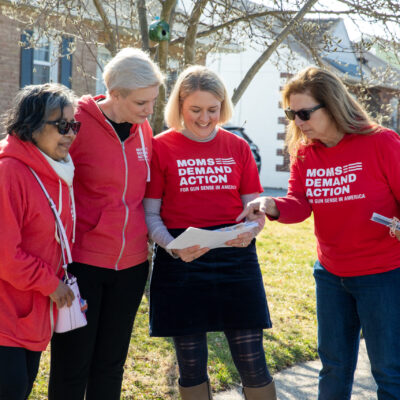Everytown Applauds Inclusion of Gun Safety Provisions as Part of Government Spending Deal
12.22.2020
Among Other Provisions, the Spending Deal Includes Funding for Gun Violence Prevention Research, Funding to Strengthen the Background Check System, Funding for Community-Based Solutions to City Gun Violence, and Efforts to Address Surging Gun Sales
NEW YORK — Everytown for Gun Safety and its grassroots networks, Moms Demand Action and Students Demand Action, released the following statements today applauding the inclusion of gun safety provisions in the FY2021 government spending deal. Among other provisions, it includes $25 million in funding for research on gun violence, $85 million to strengthen the National Instant Criminal Background Check System (NICS), $14 million to support community-based violence intervention programs, efforts to address the surge in gun sales during the pandemic, and more. The package was spearheaded by the leadership of the Chairwoman of the House Appropriations Committee, retiring Rep. Nita Lowey (D-NY), and the incoming Chairwoman, Rep. Rosa DeLauro (D-CT). This year’s government spending bill builds off of last year’s deal, which appropriated funding for gun violence research for the first time in more than two decades.
“This package is a critical step forward in answering the call for action to address our nation’s gun violence crisis,” said John Feinblatt, president of Everytown for Gun Safety. “As we head into the new year, we look forward to working with Congress and the new administration to make sure the federal government has the resources it needs to comprehensively address gun violence in all its forms.”
“Federal action to combat gun violence is more crucial than ever as we face a pandemic that has made the gun violence crisis worse,” said Shannon Watts, founder of Moms Demand Action. “This package is a great start, and we’ll keep pushing for more funding and legislation that will save lives.”
The now-passed Fiscal Year 2021 omnibus appropriations bill includes:
- Sustained investment in gun violence research: $25 million in funding for the Centers for Disease Control and Prevention and the National Institutes of Health research on gun violence and its solutions.
- Strengthening the background check system: $85 million to incentivize states to provide relevant records to the National Instant Criminal Background Check System (NICS) databases, ensuring that states that conduct their own background checks have access to the National Data Exchange (N-DEx) system, and requiring the Department of Justice (DOJ) to alert state and local law enforcement when a prohibited purchaser fails a background check.
- Addressing the surge in gun sales during the coronavirus pandemic: Requiring DOJ to provide comprehensive data on NICS checks for firearms sales that have taken longer than three business days to complete, including the number of those checks that were resolved, the number of those checks that were purged before being completed, the number of denied checks that resulted in firearm retrieval actions being referred to the Bureau of Alcohol, Tobacco, Firearms and Explosives (ATF), and the number of successful retrieval actions taken by ATF.
- Investing in community-based solutions to city gun violence: Specifying $14 million shall be used for community-based violence prevention initiatives as well as encouraging the establishment of innovative demonstration grants to hospitals to address the cyclical nature of violence in the community, and encouraging the Byrne JAG grant program to further fund evidence-based violence prevention and intervention programs, including intervention focused deterrence, street outreach, hospital-based violence intervention programs, and community inclusive violence problem analyses.
- Cracking down on illegal guns: Increasing the resources and improving the tools for identifying illegal guns and gun trafficking patterns, including increasing illegal gun trace submission training for law enforcement agencies, and supporting the use of the National Integrated Ballistic Information Network and Crime Gun Intelligence Centers.
- Preventing domestic violence: $513 million for various life-saving programs administered by the Office of Violence Against Women, $13 million for the National Domestic Violence Hotline, and $182 million for the Family Violence Prevention program.
- Investing in proven effective school safety measures: $132 million for the STOP School Violence Act grant program for proven effective strategies and programs to intervene before a shooting, like evidence-based threat assessment programs, recommending that part of the $106 million for School Safety National Activities be used to support improved access to comprehensive mental health services and establishing positive school climates, and $1 million to study the potential mental, emotional, and behavioral health effects of active shooter drills on students and staff in elementary and secondary school settings.
- Encouraging the use of effective tools to prevent veteran firearm suicide: Encouraging the Department of Veterans Affairs medical centers to utilize extreme risk protection orders, also known as “red flag” laws, and similar gun safety laws in the states that have them to intervene when there is evidence a veteran may be a threat to themselves with a firearm, and to adopt programs and protocols on secure firearm storage to reduce immediate access to firearms in moments of crisis.
- The House of Representatives took significant action on gun violence in the 116th Congress, including passing H.R. 8, the Bipartisan Background Checks Act of 2019, which would require background checks on all gun sales; H.R. 1585, the Violence Against Women Reauthorization Act of 2019, which contained life-saving provisions to disarm domestic abusers and stalkers; and H.R. 1112, the Enhanced Background Checks Act, which would address the “Charleston loophole,” which allows gun sales to proceed after three business days even if a background check has not been completed. Unfortunately, the Senate, under the leadership of Majority Leader Mitch McConnell (R-KY), did not bring any of those bills up for a vote.




